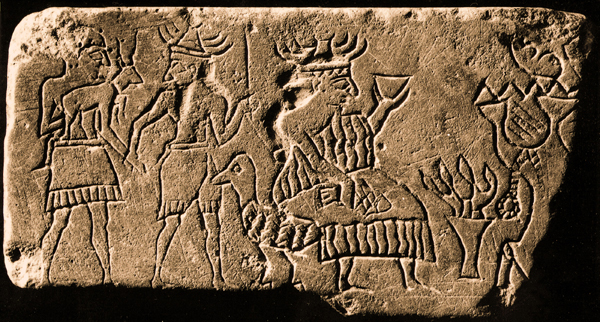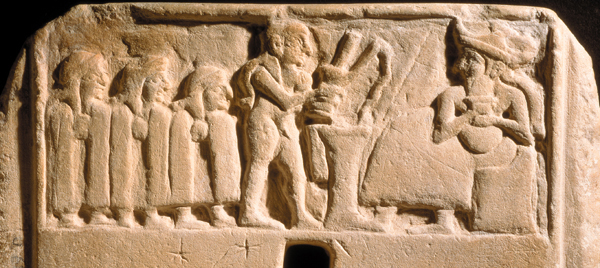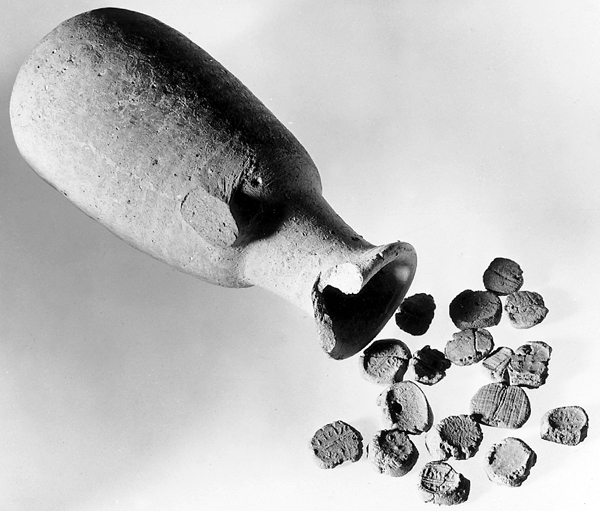
The prophet Zephaniah predicts that the Israelite God Yahweh will overcome the gods of foreign nations. These foreign deities will be deserted by their worshipers, who will turn instead to the God of Israel.
But just how God plans to defeat these false gods is not easily understood. Indeed, the question has perplexed Bible translators and commentators for hundreds of years.
According to the New Revised Standard Version (NRSV) of the Bible, God will “shrivel” these other deities:
The Lord will be terrible against them; he will shrivel (rzh) all the gods of the earth, and to [the Lord] shall bow down, each in its place, all the coasts and islands of the nations.
(Zephaniah 2:10–11)
According to the New English Bible translation, God will “reduce to beggary all the gods of the earth.” In the King James Version, God “will famish” the other deities. One recent translator suggests God will simply “rule over” the deities.1 The New Jewish Publication Society’s translation is closer to the NRSV: The Lord causes the gods “to shrivel.”
Ancient translations are equally diverse. The Septuagint and the Peshitta (ancient Greek and Syriac translations of the Hebrew Bible, respectively) translate rzh as “destroy”: “The Lord…will destroy all the gods of the earth.” The Vulgate—the Latin translation produced by the fourth-century church father Jerome—describes Yahweh “enfeebling” the other gods.
The problem for translators ancient and modern is that the Hebrew verb Zephaniah uses—rzh (pronounced razah)—appears in this form only once in the Bible; it is what scholars call a hapax legomenon (Greek for “said once”).
Fortunately, although rzh does not appear elsewhere in the Bible, words from the same root do: In these cases, the root clearly means “to make lean” or “to famish”—closer to the King James Version. Thus, Isaiah predicts, “The glory of Jacob will fade; the fat of his body will waste away (yeirazeh)” (Isaiah 17:4). And Ezekiel states, “I myself will judge between the fat sheep and the lean (razah) sheep” (Ezekiel 34:20). Furthermore, the Arabic cognate verb radhiya means “grow thin,” “grow weak.”

For this reason, most commentators today agree that “famish” is the most literal translation of rzh, but they tend to interpret the term metaphorically: Yahweh will not literally starve the gods but will somehow weaken them and render them powerless. He’ll “shrink” their domain so that they’ll have less land to rule over, one commentator suggests.2
But there’s reason to believe that the most literal reading of Zephaniah 2:10—“[The Lord] will famish all the gods of the earth”—is the most accurate, and that it need not be interpreted metaphorically.
As noted in Michael Dick’s article “Worshiping Idols,” BR 18:02, Babylonian cult statues did not just represent deities; they were themselves considered divine. Man-made cult statues were transformed into living deities during an elaborate ritual known (in both Babylon and Egypt) as the Opening of the Mouth, or the
During the Opening of the Mouth ritual, the cult statues “dined” like kings on good beer, honey and fruit.4 Worshipers offered the statues prime cuts of meat and fruit arranged artistically on golden platters. After a meal, water was brought so that the image could “wash” its hands.5 (The royal treatment didn’t stop there. On occasion, statues were taken out to hunt!)6
A rare mid-ninth-century B.C.E. inscription in the British Museum describes the Assyrian king Nabu-apla-iddina’s performance of the Opening of the Mouth ritual on a statue of the sun-god, Shamash. After washing the statue’s mouth, the king provided it with food and clothing.7 A hymn from the time of the seventh-century B.C.E. Assyrian ruler Ashurbanipal relates that until the Opening of the Mouth ritual took place, a statue of the moon-god could not “smell incense, eat food, drink water.”8
The food offered to the statues during the Opening of the Mouth ritual was simply the first of many meals presented to the statue-god. At the temple of Uruk in southern Babylon, statues were provided two meals a day, according to a second-millennium B.C.E. text from Uruk.9 As one scholar notes, “The daily care given to the statue reflects the belief that the statue was alive and needed the same attention and sustenance that any living individual would require.”10 The meals provided the god with the energy needed to perform his divine duties.11
So how will Yahweh overwhelm all the gods of the earth? Zephaniah ironically suggests that God will “famish” the statues by taking away their food. God will cut off the daily meals offered to cult statues. When the priests no longer sustain the statues with food and drink, the gods will weaken with hunger.12

There is one last puzzling detail about our passage: Zephaniah 2:10–11 is written in prose, while the surrounding passages are written in verse. Thematically, too, verses 10–11 appear to be out of place. The preceding verses are oracles against specific nations. They describe how God will desecrate the Cherethites, the Ammonites and the Moabites. The subsequent verses describe how God will bring down Ethiopia. But verses 10–11 diverge in that they discuss God’s dominion over all the nations. For this reason, scholars have suggested that these lines are a late addition to the text.13
Zephaniah tells us that he was active “in the days of King Josiah of Judah”—that is, 640 to 609 B.C.E., when the Assyrian empire was on the wane. But most scholars date Zephaniah 2:10–11 to after the Babylonian Exile.14 If this is accurate, the author of these verses may have gained knowledge of the feasts offered to Babylonian gods while in exile in Babylon.
MLA Citation
Endnotes
Liudger Sabottka, Zephanja: Versuch einer Neuübersetzung mit philologischen Kommentar, Biblica et Orientalia 25 (Rome: Biblical Institute Press, 1972), pp. 90–91.
Siegfried Morenz, Egyptian Religion (London: Methuen, 1973), p. 155. For more detailed information, see Sidney Smith, “The Babylonian Ritual for the Consecration and Induction of a Divine Statue,” Journal of the Royal Asiatic Society (January, 1925), pp. 37–60.
See Christopher Walker and Michael B. Dick, “The Induction of the Cult Image in Ancient Mesopotamia,” in Born in Heaven, Made on Earth, ed. Dick (Winona Lake, IN: Eisenbrauns, 1999).
A. Leo Oppenheim, Ancient Mesopotamia: Portrait of a Dead Civilization (Chicago: Univ. of Chicago, 1964), pp. 191–193.
Leonard William King, Babylonian Boundary Stones and Memorial Tablets in the British Museum (London: British Museum, 1912), no. 36, col. iv.1.47–v.1.7, v.39–vi.13.
Thorkild Jacobsen, “The Graven Image,” in Ancient Israelite Religion: Essays in Honor of Frank Moore Cross, ed. Patrick D. Miller et al. (Philadelphia: Fortress, 1987), pp. 26–27. Text from Henry C. Rawlinson, The Cuneiform Inscriptions of Western Asia (London: British Museum, 1861–1909), vol. 4, pl. 25, col. iii.42–66. Another version of the hymn may be found in Erich Ebeling, Tod und Leben nach der Vorstellungen der Babylonier (Berlin: de Gruyter, 1931), pp. 120–121.
Edward M. Curtis, “Idol, Idolatry,” Anchor Bible Dictionary (Garden City, NY: Doubleday, 1992), vol. 3, p. 378.
John Merlin Powis Smith, Micah, Zephaniah, Nahum, Habakkuk, Obadiah, Joel, International Critical Commentary series (New York: Scribner’s, 1911), pp. 228–229.
Gillis Gerleman, Zephanija: Textkritisch und literarische untersucht (Lund: Gleerup, 1942), p. 40; Arvid Schou Kapelrud, The Message of the Prophet Zephaniah (Oslo: Universitetsforlaget, 1975), p. 34; Carl-A. Keller, Michée, Nahoum, Habakuk, Sophonie, Commentaire de l’Ancien Testament (CAT) XIb (Geneva: Delachaux et Niestlé, 1990), pp. 199–200. Sabottka, Zephanja, pp. 83–84, 91.

